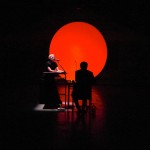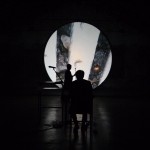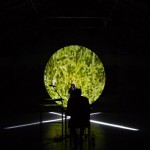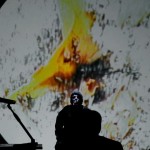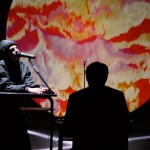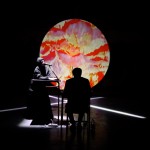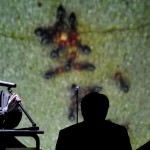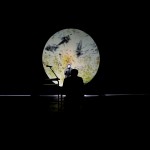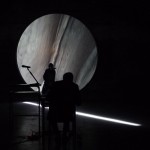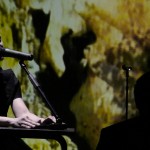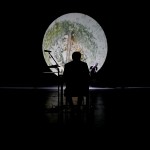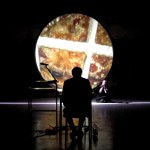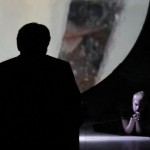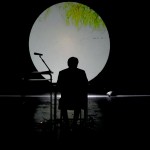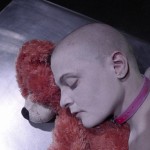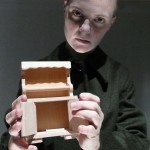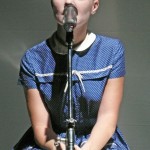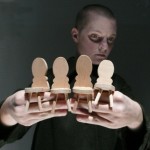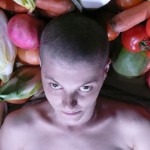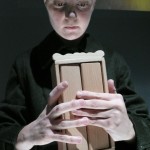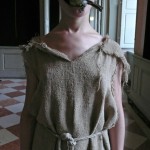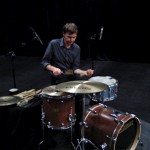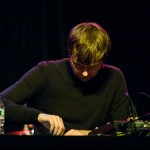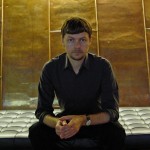HYPERION #2
Only when the houses and temples died Wild beasts dare in the doors and on the streets
First, When the houses and temples died out, the wild animals venture into the gates and streets
The fruitful artistic collaboration between Lenz Foundation e Paul Wirkus, Polish composer of electronic music, For a new paragraph inspired byHyperion, the famous novel in a epistolary form of youth work of Friedrich Holderlin. To the poet, philosopher, German romantic playwright, crazy died after almost forty years lived locked up in his tin-tuba house, Lenz has dedicated a single research path in Italy in the past years: dal 1991 al 1994 Maria Federica Masters e Francesco Pititto in fact they edited the mise-en-site of almost all of the works of Hölderlin, specially portrayed for the scene: the three drafts of The Death of Empedocles, Oedipus the tyrant, AIACE, Oedipus in Colono, Antigone, Hölderlin-Foscolo, I was of the fourths.
Première per Nature Gods Theatres 015
After several dramaturgical raids in other creations – Faust 2, Chaos, In the 2014 The directors return to the Amato author, con Hyperion/Diotima A visual and musical performance inspired by Diodima, Among the most complex of the Hölderlinian mythography and the protagonist of the philosophical-amoing dialogue with the young Hyperion. Con Hyperion #2 It is intended to give wider design breathing to the scenic-musical work that began last year with the artistic residence of Paul Wirkus and the resumption of an important collaboration with Adrian Engelbrecht, poet, musician, performer, Versatile and multifaceted artist, For a long time organic to the creative path of Lenz and interpreter in the past of the various Hölderlinian scenic writings. The new creation produced ad hoc for the twentieth edition of Nature Dèi Teatri connects clearly to the theme of the Festival: nell’Iperione or the hermit in Greece they merge constantly present and past, Germany and Greece in a continuous mutual exchange of perspectives and landscapes. In the dead Greece, Doubles died as oppressed by the Turks and immemorial of the gods, Athens appears to young hypeerion like 'An immense shipwreck, After the hurricanes and sailors who fled and the carcass of the crushed fleet lies unrecognizable on the sandbench '. But the spirit of the city had already died before the destroyers traveled Attica 'Only when the houses and temples died, Wild beasts dare to forward beyond the doors and in the streets (…). And so he continues'I was struck by the ancient door through which it came out of the ancient city towards the new (…) Now this door is there change and empty, Like a fountain that can, from the cinnamon from which joyful and clear gushes came out, fresh waters (…). The sacred chaos of Athens.’’ The echo of this deafening rumble between the folds of a prophetic text.
fromHyperion by Friedrich Hölderlin
Musica Live electronics | Paul Wirkus
Dramaturgy and imagoturgy | Francesco Pititto
Installation | plastic elements | regia | Maria Federica Masters
Performer | Adrian Engelbrecht, Valentina Barbarini
Production | Lenz Foundation for 20th Festival Natura Dèi Teatri 2015
– Hyperion/Diodima - Nature Dèi Teatri 2014. Art, useful passion
by Daniel Rizzo, Evilala.it_19 December 2014
Dall’Hyperion di Friedrich Hölderlin, The character of the famous Symposium is the protagonist of the new creation signed by Lenz Refrazioni and the Polish musician Paul Wirkus. Extraordinary manifestation of Platonic thought (It was the one who started Socrates with ideal true love) and female pole of the epistolary exchange with the beloved hypeerion in the novel of Hölderlin, Diotima is "among the most complex of the Hölderlinian mythography". Maria Federica Maestri and Francesco Pititto therefore return to investigate the "poet, philosopher, German romantic playwright "after« The staging of the three drafting of the death of Empedocle, Oedipus the tyrant, Antigone, Hölderlin-Foscolo, The fa de 1991 e 1994. A renewed interest that, not by chance, It takes place within the three -year project of the Festival Natura Dèi Teatri inspired by "philosophical suggestions taken from the work of Gilles Deleuze", because the theme of the difference, of the ideological conception of identity and repetition, of the attempt to revolt against a dialectical fate with homologating and lacerating results, It is the ideal conceptual framework to put the fundamental question of "in -depth investigation on the languages of contemporary creation". The live electronic sounds of Paul Wirkus contribute to giving full -bodied density to the setting of a beautifully simple set -up with an exemplary visual impact as it manages to return in the sign (scenographic) the perfect coincidence of meaning and signifier, thus advocating the full power of the Nietzschian affirmation "there are no facts, only interpretations »and the radicality of an intuition that recognized the interpretation (inter)subjective the ability to shape consciences and regulate bodies. An intuition reiterated almost explicitly on stage (“Forget the time, and don't count the days of life. What are the one hundred years in front of the instant in which we feel in two and only afterwards do we touch ") and which is still current today (therefore historically unrelated), Although it was Swiss in the idea that - paraphrasing that quote - there are only opinions and non -arguments. The round sheet, White and tense that Valentina Barbarini crosses very concentrated, While decking fragments ratradots dally'hyperion, It is the sublimated representation of the fullness of the Parmenideo being in all its paradoxicality (empirical). Indivisible and perfect, immobile and identical (for reason), appears (You have sensible) acted by an incurable inconsistency due to the presence of that human in the making that, Indeed, we will see physically and not projected. Therefore concrete, outside and not inside (if not as a shadow), Because inside it will only be able to scroll the images of a nature from which the man - unbearable "acid grapes ... in the midst of sweet grapes" - is banned. Maieutic and erotic, creative power of art and nature in conflict with a homo that, proclamationosi sage, has forgotten its animality, in Diotima / Hyperion Di Lenz we see the drag -like research convergence with the investigation in favor of a renewed visual return of primordial existential dilemmas: The yearning of Infinito which structurally torments the human being and his inevitable shipwreck ("But man is god just man! And if he is a god, then he is beautiful! [..] But my arms were increasingly tired and anguish dragged me down, inexorable"); The craving of a pantheistic harmony (“I was there, your. A flower between the flowers ") and the perception of historical defeat in modernity («Defend us from the flies will be our future occupation. Gnaw the things of the world, as children. Aging among the old is the worst thing. They start from the heart and return to the heart, the vene "). Diotima is then the intimately contradictory symbol of the risk of disengagement and solitude ("That I care about the shipwreck of the world! I know nothing more than my blessed island "). A risk that, seen within this specific artistic context, "An industrial building from the historical suburbs of Parma" where culture as well as resisting continues to give itself, it seems at all, How much to dispense strength and passion. Just like that song of hope and beauty that was Diotima for Hyperion. A show of disarming consistency.
http://teatro.persinsala.it/hyperion-diotima-natura-dei-teatri-2014/12540
– Nature Gods Theatres. Lenz's contaminations Refractions from Verdi to Manzoni
by Andrea Alfieri, Krapp's Last Post_13 gennaio 2015
[…] Also in the field of nature, Natura Dèi Teatri did not fail to grant an elaborate excursus in electronic and experimental music, offering Andrea Azzali's live sets, Historical creator of the music of Lenz, in “Sacred body”, specially moved to the spaces of a seventeenth -century church, and the artistic collaboration between Paul Wirkus, Acclaimed composer of Polish origin dedicated to the end of minimalist improvisation, And the same Lenz Refrazioni, in “Hyperion/Diotima”, Work inspired by the epistolary novel by Friedrich Hölderlin, German playwright to whom Lenz has dedicated a very long research path to his beginning. Musical proposals where the intertwining between sound compositions and performance is always sedimented in an expanded and contaminant border.
http://www.klpteatro.it/natura-dei-teatri-le-contaminazioni-di-lenz-rifrazioni-da-verdi-a-manzoni
– German romanticism according to the Lenz
by Laura Bevione, Amandaviewontheatre_16 December 2014
[…] The Lenz have returned to deal with an author, Friedrich Holderlin, who in the past have repeatedly attended. The chosen text is a youthful epistolary novel, Hyperion, that the German writer dedicates to Diotima - according to classical literature the woman loved by the unfortunate hypeerion - identity behind which the woman he was in love with. The Parma company chooses to entrust to a single actress - Valentina Barbarini, Mighty and highly emotional presence - the parts of both lovers and to make acting dialogue with powerful and obsessive music composed of hoc by Paul Wirkus, Polish electronic musician who has been collaborating with Lenz for some time, And with the images that flow on a circular screen on the bottom of the stage. The word - poignant and passionate - is amplified by the antinaturalist and ardent trend of acting as well as by the anxious rhythm of music, elements to which only the landscapes and natural details that occur on the screen are opposed only. Romantically, Nature is a non -deforming mirror but truthful of the soul - instead of the external aspect - of men. A show, as well as Adelchi, that Amanda hopes that many manage to see.
German romanticism according to the Lenz
– Hypeerion and Diotima merge for Lenz
by Mariagrazia Manghi, Gazzetta di Parma_15 December 2014
Iperione and Diotima, The hero and his beloved, They become a being alone in the new creation of Lenz refractions made ad hoc by nature gods theaters 2014, Inspired by Friedrich Hölderlin's Hyperion. It is Valentina Barbarini who faced the challenge of a text on stage that takes up fragments of the epistolary work of the German romantic. The actress appears to be announced by hammering strokes, Like a shadow from behind a large circular screen. Dressed and hooded is hyperyon for the first part of the performance; without headdress repeats the same sequence of words and gives voice to Diotima. The dramaturgical choice privileged the tragic reflection on the existence and meaning of man and his action, “One thing that boils and ferments like a chaos, rotten like a tree that never manages to become mature ". A journey into the thought of the German lyrical poet suspended between classicism and romance and also in his madness. Of Hölderlin the theme of the pantheistic celebration of nature returns, expression of a totality in which man is lost and finds himself, of the vagueness of love and pain, true dimension of reality: “If your garden is full of flowers, because his perfume does not come to me?”. A tragic conception in which the extreme opposition of the romantic soul is consumed, "I wanted to build a temple to the god of enthusiasm, But my arms were increasingly tired and anguish dragged me down inexorable ". The vocal presence of Valentina Barbarini is powerful. The music, An electronic creation of the Polish musician Paul Wirkus, It is an obsessive rhythmic pulsation, at times pressing, that accompanies more than dialogue. The visual impact is, As always in the works of Lenz, cared for and sophisticated in the choice of images and in color combinations. Trees flow and overlap, leaves, insects, everything to which man could draw on to look to infinity, solved in a frantic swarming that reminds the inexorable decomposition. A tragic vision, The awareness of a loss of the sense of divine and the harmony that Lenz makes his own: “That I care about the shipwreck of the world. I know nothing more than my blessed island ".







